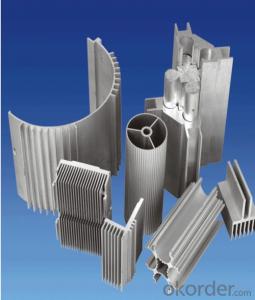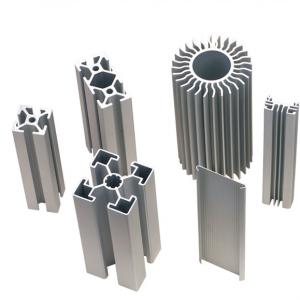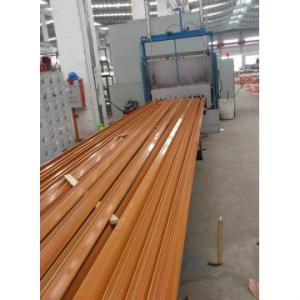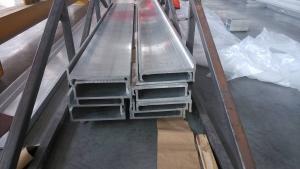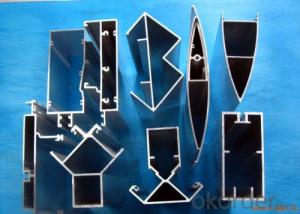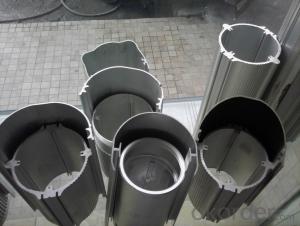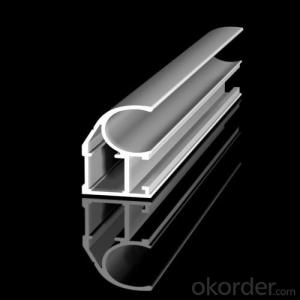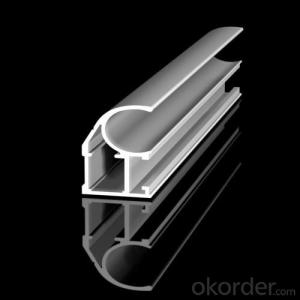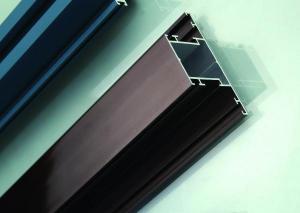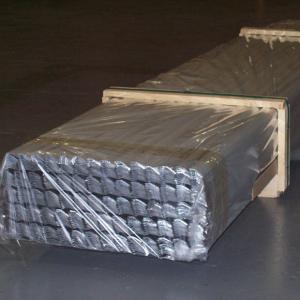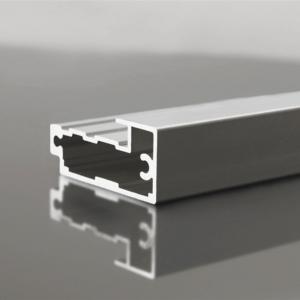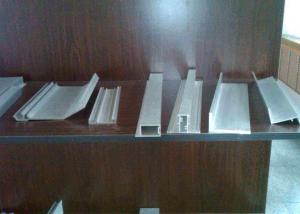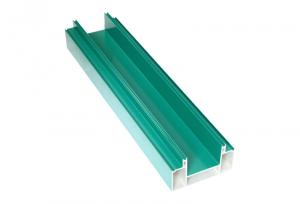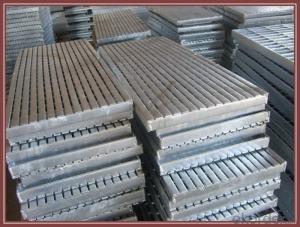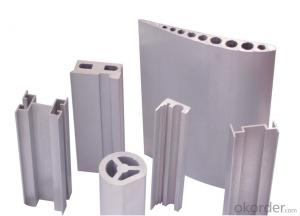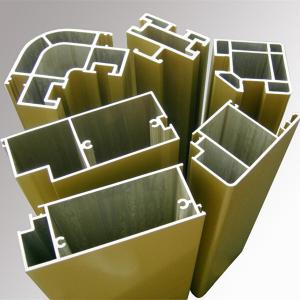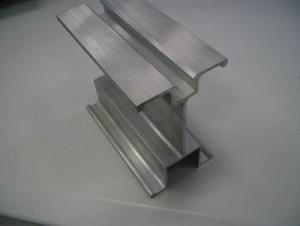Aluminium profile construction and industry
- Loading Port:
- China Main Port
- Payment Terms:
- TT OR LC
- Min Order Qty:
- -
- Supply Capability:
- -
OKorder Service Pledge
OKorder Financial Service
You Might Also Like
Aluminium is a relatively soft, durable, lightweight, ductileand malleablemetalwith appearance ranging from silvery to dull gray, depending on the surfaceroughness. It is nonmagnetic and does not easily ignite. A fresh film ofaluminium serves as a good reflector (approximately 92%) of visible lightand an excellent reflector (as much as 98%) of medium and far infraredradiation. The yield strength of pure aluminium is 7–11 MPa,while aluminium alloys have yield strengths ranging from200 MPa to 600 MPa. Aluminium has about one-third the densityand stiffness of steel. It is easily machined,cast, drawn and extruded.
Features:
Material | Alloy 6063,6061,6005or according to customer’s choice |
Temper | T3, T4, T5, T6 |
Surface | Anodize, electrophoresis, powder coating, PVDF coating, wood grain painting, matted, etc. |
Length | Coating 6.5 meters, Anodizing 6.5 meters, Mill finish 5 meters |
Application | Industrial, electrical equipment(TV set, air conditioner, refrigerator, computer), decoration,construction, transportation |
Custom Made | We can package following with customer's request. |
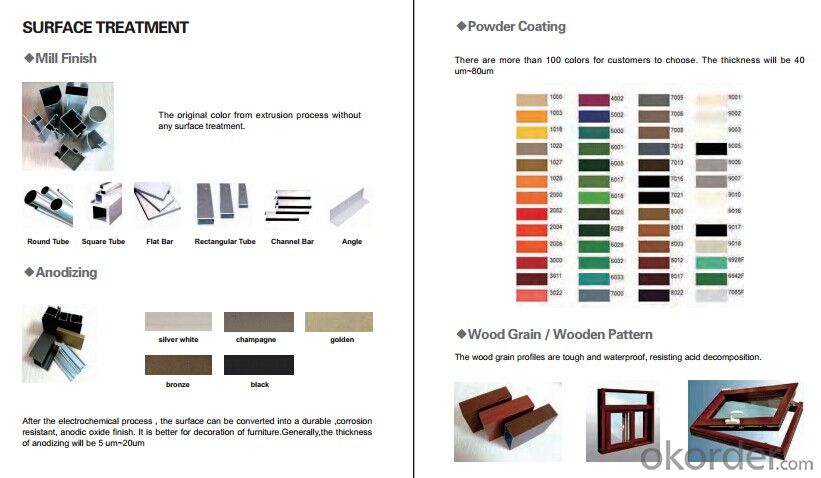
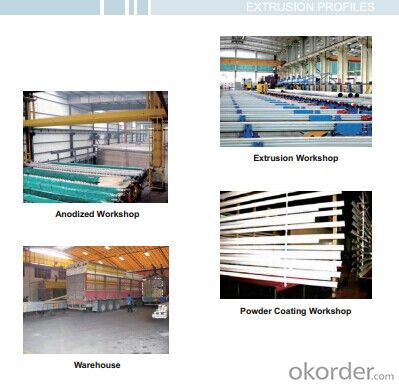
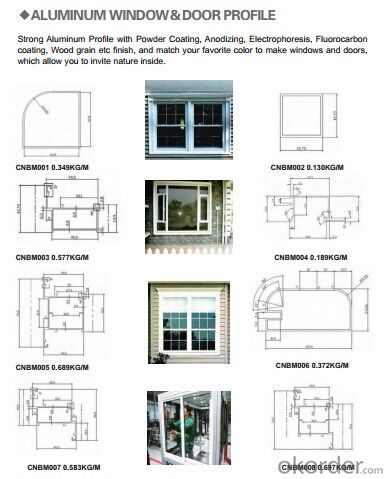
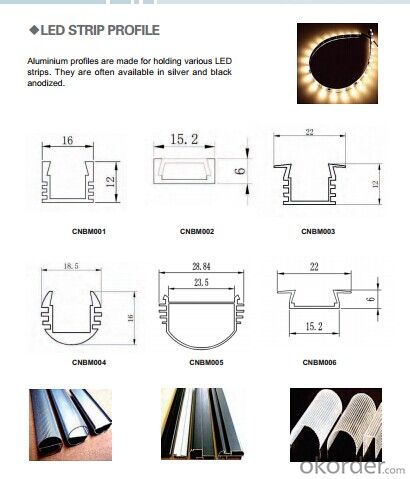
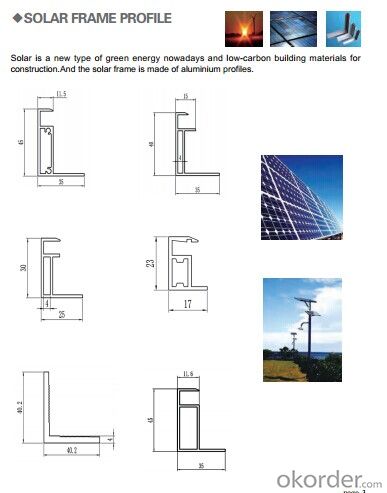
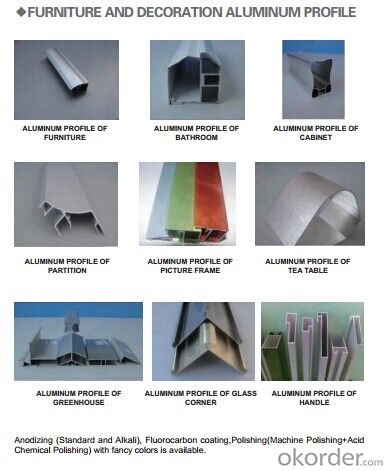
- Q:I have a disinfection cabinet to cut off a piece of aluminum to install the control board, how to cut? What tool to cut?
- The use of wire saw can be sawed, if you cannot use a wire saw, it can only be used to drill holes along the need the position of the drill hole, finally use a tool to trim it to the edge.
- Q:Are aluminum profiles suitable for medical equipment?
- Yes, aluminum profiles are suitable for medical equipment. Aluminum is lightweight, durable, and corrosion-resistant, making it an ideal material for constructing various medical devices and equipment. It also offers versatility in terms of design and can be easily customized to meet specific requirements. Additionally, aluminum profiles can be easily sterilized, making them suitable for use in medical settings where hygiene is crucial.
- Q:Are aluminum profiles suitable for conveyor rollers?
- Yes, aluminum profiles are suitable for conveyor rollers. Aluminum is a lightweight and durable material that provides excellent strength and resistance to corrosion. It is widely used in conveyor systems due to its ability to handle heavy loads and its low maintenance requirements. Additionally, aluminum profiles can be easily customized and designed to fit specific conveyor applications.
- Q:Can aluminum profiles be used in structural applications?
- Yes, aluminum profiles can be used in structural applications. Aluminum is a lightweight and versatile material that offers excellent strength-to-weight ratio and corrosion resistance. It can be easily formed, welded, and machined, making it suitable for various structural projects such as building frames, bridges, and industrial structures.
- Q:Are aluminum profiles durable?
- Yes, aluminum profiles are highly durable.
- Q:What are the different fastening options available for aluminum profiles?
- Various fastening options are available for aluminum profiles, depending on the specific application and desired functionality. Some commonly used options are: 1. Using screws is a popular method for fastening aluminum profiles. They are easy to install and provide a strong and secure connection. Self-tapping screws are often used as they create their own threads in the aluminum profile. 2. Bolts and nuts offer another reliable option for fastening aluminum profiles. They provide a strong connection and can be easily tightened or loosened as required. It is important to choose the appropriate size of bolts and nuts and ensure proper tightening to avoid stripping or loosening of the connection. 3. T-slot nuts are specifically designed for T-slot aluminum profiles, which have a groove along their length. T-slot nuts slide into the groove and can be easily positioned and tightened using a hex key. They offer a versatile and adjustable fastening option, allowing for easy repositioning or modification of the profile. 4. Clamps are commonly used to secure aluminum profiles together or attach other components to the profile. They come in different designs, such as corner clamps or angle clamps, and provide a quick and easy way to assemble or disassemble aluminum structures. 5. Adhesives can be used to bond aluminum profiles together, providing a clean and seamless appearance. However, the strength of the bond may vary depending on the adhesive and surface preparation. It is important to choose an adhesive specifically designed for aluminum and follow the manufacturer's instructions for proper application. 6. Welding is a permanent fastening option for aluminum profiles. It involves melting the aluminum material and fusing it together, creating a strong and durable connection. However, welding requires specialized equipment and skills, making it a more complex and time-consuming process. When selecting the appropriate fastening option for aluminum profiles, it is crucial to consider the specific requirements of the application, such as load-bearing capacity, adjustability, or disassembly needs. Consulting with experts or manufacturers can help in choosing the most suitable fastening method for a particular project.
- Q:Can aluminum profiles be used in interior design applications?
- Yes, aluminum profiles can be used in interior design applications. They are versatile, lightweight, durable, and available in various finishes and designs. Aluminum profiles can be used for creating furniture, partitions, shelving, lighting fixtures, decorative elements, and more, adding a modern and sleek aesthetic to interior spaces.
- Q:How are the tonnage grades of aluminum extrusion machines classified?
- Aluminum Alloy stamping metal iron because material is relatively soft, expensive, easy to break and some Aluminum Alloy products also need subsequent processing, such as drawing, anode processing, especially in stamping production to produce top injuries, scratches, in the mold manufacturing should pay special attention to the following:1, for the project does not affect the number of cases, punching as far as possible behind the project, punching, and even for punching a large number of products, may consider more than one project, but also the punching line in the back.2, aluminum material is soft, and the mold is easy to block material, so in the design of mold gap should be put bilateral material thickness of 10% gap, the knife edge straight depth to 2MM is more appropriate, the taper to 0.8-1 degrees is appropriate.3, bending forming, because aluminum material in bending when easy to produce aluminum chip, will cause spot injury, indentation, aluminum raw material needs to stick PE film, in the roller and electroplating case, forming block with polishing hard chromium is better.4, the need for anode processing after stamping, such as pressing and flattening process of 180 degrees, the product can not be completely pressed, completely pressed will spit acid phenomenon for 0.2-0.3MM seam, acid to timely outflow, so we must do this step on the limiting block and calibration mode is higher than the norm out on.5, because the aluminum material is crisp, easy to crack, especially in the case of anti flanging, so try not to do the line, even if you want to do, but also to make the line width a little bit, a little lighter.6, all aluminum blade are required to use wire cut, to prevent the burrs and blanking is not smooth, easy to produce high temperature aluminum, so the punch hardness requirements of more than 60 degrees, at least with SKD11 material, has no D2 arithmetic matter punch.
- Q:How do aluminum profiles handle extreme weather conditions?
- Aluminum profiles are known for their excellent resistance to extreme weather conditions. Due to their inherent corrosion resistance, they can withstand exposure to rain, snow, UV radiation, and high temperatures without deteriorating or losing their structural integrity. Additionally, aluminum profiles have a low thermal expansion coefficient, making them highly stable and resistant to warping or cracking in extreme temperature fluctuations. Overall, aluminum profiles are a reliable choice for outdoor applications, as they can handle a wide range of weather conditions with minimal maintenance.
- Q:Can aluminum profiles be used for signage or display purposes?
- Certainly, signage or display purposes can definitely utilize aluminum profiles. Aluminum, a versatile and durable material, finds wide usage in several industries, including signage and display. By providing a robust framework, aluminum profiles ensure stability and longevity for signs and displays. Due to its lightweight nature, aluminum is effortless to handle and install, thus making it a favored option for both outdoor signage and indoor displays. Additionally, aluminum profiles can be easily customized and fabricated into diverse shapes and sizes, thereby allowing for creative and flexible designs. In addition, aluminum profiles possess excellent resistance against corrosion, guaranteeing the signage or display's good condition even in outdoor or high-moisture environments. This quality renders them suitable for a broad range of applications, such as storefront signs, directional signs, trade show displays, exhibition booths, and many others. Moreover, aluminum profiles can receive powder coating or anodization to impart an ornamental finish, thereby enhancing the visual appeal of the signage or display. This offers branding and customization options, thus making aluminum profiles an excellent choice for businesses aiming to showcase their brand identity. Overall, aluminum profiles serve as a dependable and versatile choice for signage or display purposes. They possess strength, durability, design flexibility, and corrosion resistance, which makes them suitable for various applications across different industries.
1. Manufacturer Overview |
|
|---|---|
| Location | |
| Year Established | |
| Annual Output Value | |
| Main Markets | |
| Company Certifications | |
2. Manufacturer Certificates |
|
|---|---|
| a) Certification Name | |
| Range | |
| Reference | |
| Validity Period | |
3. Manufacturer Capability |
|
|---|---|
| a)Trade Capacity | |
| Nearest Port | |
| Export Percentage | |
| No.of Employees in Trade Department | |
| Language Spoken: | |
| b)Factory Information | |
| Factory Size: | |
| No. of Production Lines | |
| Contract Manufacturing | |
| Product Price Range | |
Send your message to us
Aluminium profile construction and industry
- Loading Port:
- China Main Port
- Payment Terms:
- TT OR LC
- Min Order Qty:
- -
- Supply Capability:
- -
OKorder Service Pledge
OKorder Financial Service
Similar products
New products
Hot products
Related keywords
